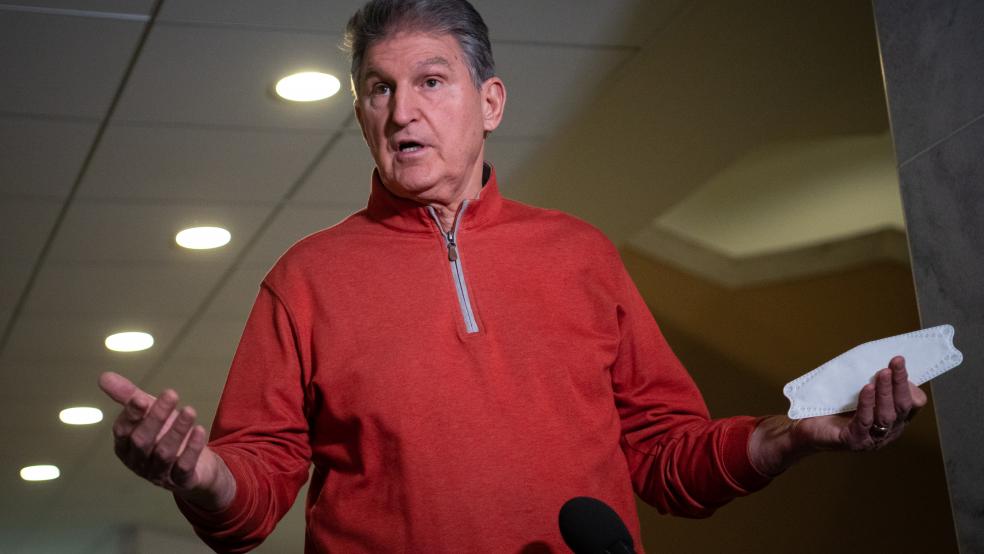The White House shot down a report Tuesday that it is working on a scaled back version of President Joe Biden’s Build Back Better plan that aims to salvage climate change measures while cutting programs including the child tax credit and paid family leave.
Reuters reported Tuesday morning that the Biden administration is looking to “reset” talks with lawmakers as it tries to rescue elements of the president’s stalled bill. A slimmed-down version of the plan would likely include more than $1 trillion in new spending, Reuters’ Andrea Shalal and Jarrett Renshaw reported, but it could pare back or completely scrap proposals to invest hundreds of billions of dollars in programs like paid family leave, universal pre-kindergarten and home health care. The White House and Democrats are also reportedly considering setting lower income caps for the child tax credit and other programs.
Reuters added that the White House is looking to shape the plan to accommodate the demands of Sen. Joe Manchin, the centrist West Virginia Democrat who effectively scuttled the House version of the bill last month by announcing he couldn’t support it. In an evenly divided Senate, and with Republicans uniformly opposed to the Biden plan, Democrats need Manchin’s vote — and that of every other member of their caucus.
“There's not a lot of mystery anymore about what Manchin would accept,” one unnamed source reported to be working on the revised plan told Reuters. “We need to calibrate as much as possible to what he can accept, and then there needs to be a personal ask (by Biden) for his vote.”
The White House calls the report “wrong”: White House spokesman Andrew Bates quickly denied the Reuters report, per The Hill. “Reuters is wrong,” Bates said in a statement. “We are always in touch with members about this, and the substance and details of this report are off-base.”
Will breaking up BBB be Democrats’ Plan B? Sen. Tim Kaine (D-VA) acknowledged Sunday in an appearance on CBS’s “Face the Nation” that the most recent version of the Build Back Better package is “dead,” but he argued that Democrats could still salvage the main pieces of the package.
“The most recent version of it is not going to happen, but if you look at the core of the bill, I think the core is education and workforce and things like reduced child care and education expenses, workforce training and then support for the workforce in areas like health care,” he said. “There are other pieces of the bill that are more controversial. I still believe we're going to find a core of this bill, whatever we call it, we're going to find the core of the bill and pass it, and it will deal directly with some of these inflation concerns.”
Some House Democrats running for re-election in swing districts have been pushing party leaders to break up the massive spending bill and instead hold a series of votes on popular provisions — even if those separate pieces can’t pass. The Washington Posts’ Marianna Sotomayor reports:
“These members have argued to top House leaders in recent days — so far, to no avail — that holding votes on narrow measures such as curbing prescription drug costs and extending the child tax credit would help Democrats make a case that they can improve voters’ lives economically despite soaring inflation and other issues that have dragged down Biden’s approval ratings. …
“Members believe it is entirely possible to strip out the prescription drug and the child tax credit provisions and pass them as stand-alone bills because some Senate Republicans have previously expressed supporting reforms. However, there has not been any formal outreach to Republicans for a bipartisan path forward and no guarantee that the necessary 10 would support these policies.”
Democrats including Rep. Susan Wild (D-PA) reportedly pushed back at a meeting earlier this month when House Majority Leader Steny Hoyer (D-MD) argued against abandoning the larger package, which he said still had a chance of passing. “If there is still hope for Manchin to agree, we need to figure out when that’s going to be and what we are doing if he doesn’t meet that deadline because in the past, he hasn’t. What’s our next plan?” Wild told the Post.
Sotomayor reports that another group of “front-liners” running in competitive districts is looking to move on, emphasizing the bipartisan infrastructure plan passed last year and other legislative accomplishments instead of getting bogged down by in the Build Back Better quagmire.
The bottom line: Democrats will be circling back to Build Back Better after this week’s voting rights push, but it’s still not clear how they want to approach the package and if they can coalesce around a strategy for the legislation.





